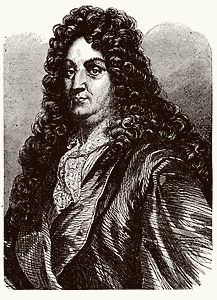Death of Racine

It so happened that one evening that he was between the king and Mme de Maintenon1, at her place, the conversation turned to Paris theatres. After having exhausted the subject of opera, they turned to comedy. The king wanted to know about parts and actors, and asked Racine why, from what he heard people say, the art of comedy had so dramatically dropped from what it once was. Racine gave him several reasons, and finished with those which, in his opinion, had the greatest share in it, which were that, for want of authors and good new plays, actors gave the old ones and amongst these, plays by Scarron which were worth nothing and which found no favour with anybody. At this the poor widow blushed, not because of the reputation of the legless author being attacked, but from hearing his name spoken, and in front of his successor. The king got embarrassed; the silence which then followed woke up the poor Racine, who realized in what deep well his disastrous distraction had just hurled him. He remained the most confounded of the three, not daring so much as to raise his eyes or to open his mouth. This silence lasted longer than just a few moments, so profound and heavy was the surprise. The end was that the King sent away Racine, saying he was going to work. He left distraught and made his way as he could to Cavoye’s2 room. He was his friend, he told him how stupid he had just been. And he had been to such an extent that it was all beyond repair. Neither the King nor Madame de Maintenon ever spoke to him again, or even looked at him. He conceived so much sorrow at this, that he fell into a languor, and died less than two years afterwards.
1. Widow of the poet Scarron and morganatic wife of Louis XIV (1636-1719). She played a very important part in history. Saint-Simon thinks of her extremely unfavourably.
2. The marquis de Cavoye (1640-1716), famous courtier. It is him, or perhaps Villeroy, whom La Bruyère protrays in Menippe, “the bird adorned with various feathers”. (On personal Merit.)
Extract from Memoirs of Saint-Simon, by Le Goffic & Tellier, 1888.
Tags: characters, french, history, king of France, literature, Memoirs of Saint-Simon, Racine, seventeenth century, theatre


